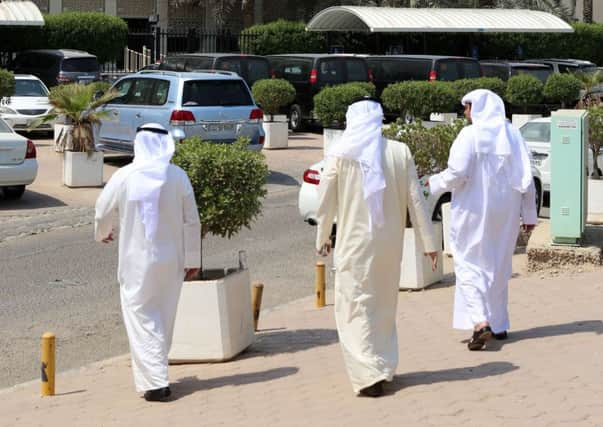7 sentenced to death over IS bomb at Kuwait mosque


Another eight defendants received prison terms ranging from two to 15 years, while another 14 were acquitted by Judge Mohammad Al-Duaij in his verdict, the state-run KUNA news agency reported.
Judge Mohammad al-Duaij read out the ruling before a packed courtroom, saying: “The court draws attention to the dangers of this extremist ideology that resorts to terrorism for its implementation.”
Advertisement
Hide AdAdvertisement
Hide AdMr Duaij called on the authorities to root out jihadist ideology.
Defence lawyers for those convicted could not be immediately reached for comment. Typically, those sentenced to death can appeal.
The nationalities of those who were sentenced to death are not clear.
The June 26 bombing during Friday prayers inside one of Kuwait’s oldest Shiite mosques, carried out by a Saudi citizen identified as Fahad Suleiman Abdulmohsen al-Gabbaa, shocked the normally peaceful oil-rich nation.
The blast at the Imam Sadiq Mosque, which also wounded 227 people, was the first major terrorist attack in Kuwait in more than two decades.
After the blast, the Islamic State group claimed responsibility for the attack. The Sunni extremists, who hold a third of Iraq and neighbouring Syria in their self-declared “caliphate,” view Shiite Muslims as heretics and have attacked their mosques in other countries across the Middle East.
Tunisia and France saw attacks on the same day as the Kuwait blast, although no definite link between them has been established.
The attacks came in the Islamic holy month of Ramadan, when Islamic State had urged its followers to mount attacks. In May, Islamic State carried out bombings on consecutive Fridays at Shia mosques in Saudi Arabia.
Advertisement
Hide AdAdvertisement
Hide AdIt has also carried out similar attacks in neighbouring Yemen and Iraq.
Executions remain rare in Kuwait, though it hanged five convicted criminals in 2013, according to Amnesty International. There were no executions in Kuwait last year.
For decades, Kuwait has been among the safest and quietest corners of the Middle East, with Sunni and Shiite Muslims living alongside each other in relative peace.
It suffered an invasion under former Iraqi leader Saddam Hussein in the first Gulf War, but traditionally has not faced extremist attacks.
The last major attack in Kuwait was in 1983, when Iranian-backed Shiite militants from Iraq carried out bombings that killed at least five people and targeted Western embassies.